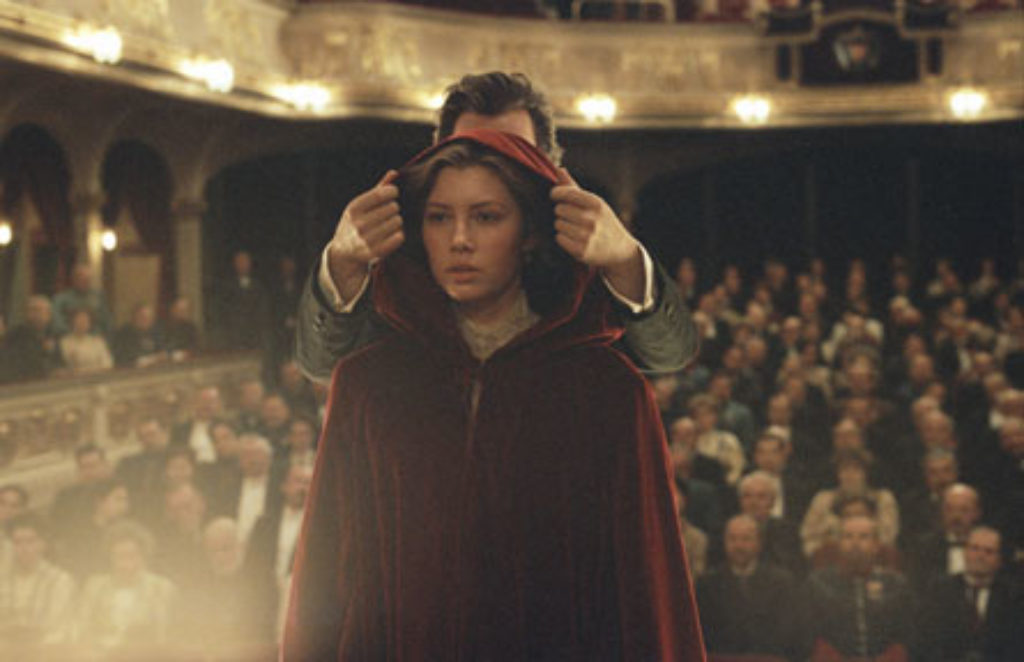
When the teenage son of a carpenter with a gift for magic tricks falls for the daughter of a local duke, he is driven from the village to keep their cross-caste relationship from blooming. Flash forward 15 years to 1900 Vienna. The boy is now a popular stage illusionist known as Eisenheim. His mind-boggling routine draws the attention of Crown Prince Leopold. And when Leopold’s fiancée volunteers at a performance to assist Eisenheim onstage, the illusionist is shocked to discover she is his long lost love, the Duchess Sophie. To spend more time with her, Eisenheim jumps at the opportunity to perform a private show at Leopold’s castle.
The arrogant Crown Prince is known to be violent with his women and appears to be using Sophie merely for political gain. Uhl, Vienna’s chief inspector of police and a fan of magicians, warns Eisenheim not to cross Leopold. Heedless, the illusionist makes a fool of the prince in front of his friends and convinces Sophie to try to leave the man and come away with him. Leopold responds with a vengeance. Eisenheim challenges Uhl to stand up to Leopold in the name of justice, but Uhl knows to do so could cost him his life.
Eisenheim, distraught, takes matters into his own hands. He begins performing shows in which he appears to be communicating with the dead. And he uses his influence to turn his fans against the Crown Prince. What no one knows is whether Eisenheim now has real supernatural powers or if he’s merely the best illusionist the city has ever seen.
The film hinges, in part, on whether Chief Inspector Uhl will take the risk of standing up against a corrupt authority or protect his own career interests and safety. [Spoiler Warning] Eventually, he follows the path of integrity. Eisenheim also takes great risks to help those he loves.
The central mystery is meant to revolve around whether Eisenheim is merely a talented illusionist or genuinely possesses supernatural powers, particularly the power to speak to the dead (who are produced upon his stage in the form of translucent holograms). His act is so successful that a local spiritual movement springs up, claiming Eisenheim’s ability as evidence for the “immateriality of the soul.” Eisenheim both proclaims and denies that he has supernatural powers. However, the film’s final moments do indeed reveal the nature of his abilities, a revelation central to Leopold’s skepticism, criminal activity and corruption.
Women bare cleavage in period costumes. There is some passionate kissing, and one brief sex scene between unmarried characters includes close-up (and therefore somewhat indistinct) images of intimate caressing and skin on skin. (Afterwards, he’s seen shirtless, and the camera also catches her bare back.)
An onstage illusion includes the image of a woman being theatrically struck down by a sword, causing an empty robe to collapse in a heap. Leopold strikes Sophie across the face. The murder of one character by another with a sword figures prominently into the story. We don’t witness the moment of attack, though we do later see a bloody neck wound on the body. A man kills himself by shooting himself in the head, resulting in a little blood briefly witnessed.
At one of Eisenheim’s shows, the audience clashes with police. When he’s a boy, Eisenheim is grabbed and pushed to the ground. Leopold pulls a pistol on Uhl. A police officer is bodily tossed out of theater and into the street.
At worst, a possible exclamation of “d–n.”
Alcohol is consumed with meals. Crown Prince Leopold gets drunk on several occasions. A character is drugged.
Based on a short story by Steven Millhauser, The Illusionist is meant to be a moody little puzzle of a fairy tale. And director Neil Burger certainly assembled the right cast to pull it off (among them, Ed Norton, Paul Giamatti and Rufus Sewell). The period story is mysterious, tricky and potentially quite satisfying. But the final experience, though diverting, doesn’t live up to its potential.
For one thing, Burger chooses to present the whole film in a replica of the hand-cranked autochrome process look of the early days of cinema. The fluttery, monochromatic, dark-at-the-edges technique creates an interesting effect evocative of the turn-of-the-century time period. But it also adds a distracting layer between the screen and the audience that kept me from fully immersing in the story. Similarly, the writing and sometimes plodding pace of the fable kept me at arm’s length from the characters. In the end, the story feels as if it should have been much more engaging and satisfying than it actually is.
Additionally, and of spiritual note, Eisenheim’s vague occult references (as part of this stage act) raise concerns, especially when he allows a movement to spring up in Vienna in support of the notion that he can summon the spirits of the dead. Even his offstage denials leave the question open. Whatever is revealed in the story’s final moments (and I’ll refrain from giving away the answer), viewers are asked to ponder the dark possibilities for the length of the film.
On the other hand, I applaud Burger for not resorting to overly graphic sex, violence and language in an attempt to amp the wattage. The Illusionist‘s stage is not pristine by any definition, but the filmmakers do seem to have embraced the illusionist’s creed that what is not seen can often be more powerful than what is revealed in plain sight.
